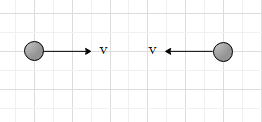Question
Question: Suppose we define a quantity ‘linear momentum’ as linear momentum = \(mass \times speed\). The linea...
Suppose we define a quantity ‘linear momentum’ as linear momentum = mass×speed. The linear momentum of a system of particles is the sum of linear pomenta of the individual particles. Can we state a principle of conservation of linear momentum as ‘linear momentum of a system remains constant if no external force acts on it’?
Solution
To verify the assumed principal, consider a system of two particles such that the two particles undergo a perfectly inelastic collision with no external force acting on the system. The masses and the speeds of the particles are the same. Use the given definition of linear momentum of a system.
Complete step-by-step answer:
In the question it is assumed that there exists a quantity called linear momentum and it is defined as the product of the mass and the speed of a particle.
In case of a system of particles, the linear momentum of the system is equal to the sum of the linear pomenta of the individual particles of the system. Then it is asked whether we can state a principal that says that when there is no external force acting on the system, the linear momentum of the system remains constant.
Let us verify the assumed principal by considering a simple system of two particles.
Let the two particles have the same speeds but both are travelling in opposite directions on the x-axis. Let the speeds of both the particles be v and let both have the same mass m.

Assume the external force is zero.
The linear momentum of the system is mv+mv=2mv.
Since these particles are travelling in opposite directions, they will collide with each other. Suppose the collision is perfectly inelastic. Then from conservation of linear momentum we get that both particles will come to rest after the collision.
Now, the linear momentum of both the particles is zero.
This means that after the collision, the linear momentum of the system is zero.
Therefore, the linear momentum of the system before collision is not equal to the linear momentum of the system after collision. This means that the linear momentum of the system is not constant.
Therefore, we cannot state a principle of conservation of linear momentum as ‘linear momentum of a system remains constant if no external force acts on it’.
Note: Please note that the quantity ‘linear momentum’ defined here is not the same as linear momentum that we know about.
Linear momentum of a particle is defined as the product of mass and the velocity of the particle.
Linear momentum is a vector quantity, whereas linear momentum will be scalar quantity.
In addition, when the external force on a system of particles is zero, the linear momentum of the system remains constant.
